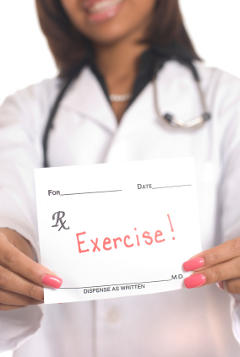Do You Really Need to See a Doctor Before Exercising?

You’ve seen it hundreds of times. A nasty disclaimer that begins with a big, red WARNING that gets in the way as you start up an exercise DVD or stream an exercise video. “See a doctor before starting any exercise program,” it reads. Here by dragons. This means you.
You try your best to fast forward through it, and then don’t give it a second thought.
I bet you haven’t even read FitWatch’s disclaimers, right?
Sure, a company adds those disclaimers as a “CYB” (Cover Your Butt!), but there are certain circumstances when it’s important for you to see a doctor before exercising. We want to help, not hurt, you.
When you exercise, certain physiological changes happen to your body.
- You put additional stress on your bones and joints.
- Your body burns fat and glucose for energy to fuel the muscles.
- Your heart rate and the amount of blood pumped to the body increases.
- Your blood flow is diverted away from your abdominal area to provide more blood to the muscles.
- Your blood pressure changes as you exercise: your systolic number — the number on top — increases.
It’s important to know your whole body is in good working order before you head out for a run, start pumping iron or do a downward facing dog.
Here are the questions you should be asking yourself before you start exercising:
There are certain risk factors that — either on their own or combined together — warrant a visit to the doctor before you start exercising. These risk factors assess your risk of heart disease, as well as any other factors that put you at risk if you’re not careful.
Age
Are you male and 45 years or older?
Are you female and 55 years of age or older?
Family History
Did you father (or male sibling/offspring) die of heart problems or sudden death before age 55?
Did your mother (or female sibling/offspring) die of heart problems or sudden death before age 65?
Smoker
Do you currently smoke or did you quit smoking within the past 6 months?
High Blood Pressure
Do you currently have high blood pressure?
Cholesterol Levels
Do you have high levels of cholesterol?
Diabetes
Do you have diabetes or a high fasting blood sugar level?
Obesity
Are you obese?
Not sure? Here are a few ways to figure that out:
- Is your BMI greater than or equal to 30? BMI Calculator
- Is your waist measurement greater than: 40” (men) or 35” (female)?
- Is your waist/hip ratio greater than .95 for men or .86 for women? Waist / Hip Ratio Calculator
Sedentary Lifestyle
Do you participate in a regular exercise program or get at least the minimum recommended guidelines?
Heart Problems
Do you have any current or past heart problems? Has a doctor ever said you had a heart problem and that you should only do exercise as recommended by a doctor?
Metabolic Diseases
Do you have diabetes or a thyroid problem, or any other type of metabolic disease? You may need to adjust your medication.
Respiratory Diseases
Do you have any respiratory diseases, like asthma or COPD? Exercise may or may not aggravate your condition.
Bone or Muscle Injuries / Illness
Do you have any current or past injury that needs special attention while exercising? Have you had any surgery in the past year?
Medications
Are you currently taking any medications? Certain medications can affect how your body reacts to exercise. For example, beta blockers can reduce your resting, exercise and maximal heart rates.
Pregnancy
Are you pregnant or have you given birth within the past three months?
Some Other Factor
Is there any other reason you can think of that might prevent you from exercising?
If you don’t know the answer to some of these questions because you haven’t seen a doctor in years, now would be a good time to make an appointment for a physical checkup.
Having one or more risk factors doesn’t mean you can’t exercise at all. It means that you need to talk to your doctor to see if there are any special recommendations or guidelines you need to follow when exercising – whether it’s cardio, weight training or flexibility.
- Someone with arthritis may need to warm up and cool down for a longer period of time.
- A pregnant woman may be advised to gradually reduce exercise intensity as the pregnancy progresses or to avoid certain moves.
- Someone with heart disease may need to go through doctor-supervised exercise tests to determine a safe level of exercise.
Exercise, when done properly for any conditions you may have, will help to either remove or alleviate risk factors. Exercise has many benefits and can help you – but you need to be aware that it can also hurt you, if not done properly. Those warnings and disclaimers are there not only for a business but for your health and safety, too.
Must Read
Benefits of Exercising Daily
How Often Should You Exercise
12 Week Walking Program for Weight Loss
